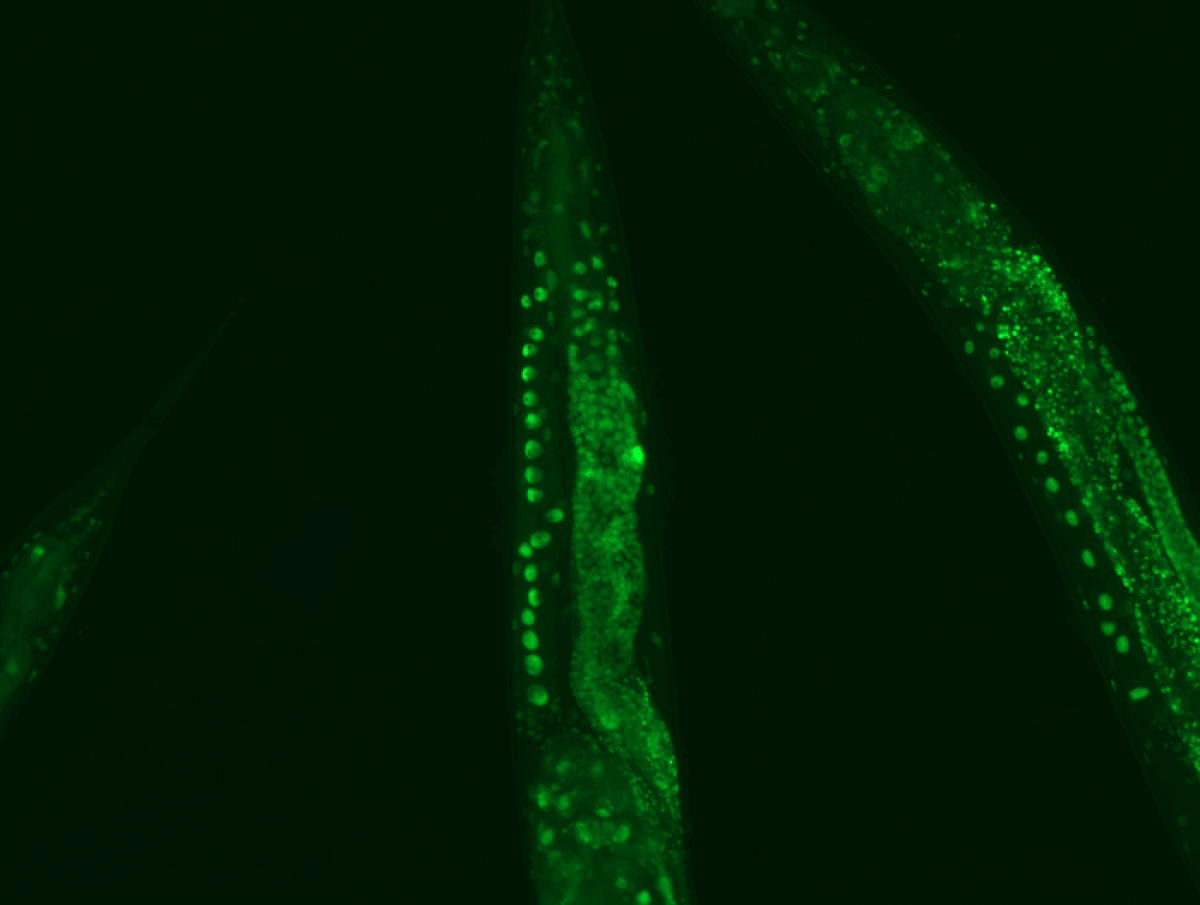COLOGNE, Germany — Florida is a popular retirement spot because of its warm temperatures and sizzling beaches. If you’re looking to live for many years after retirement, however, scientists recommend looking for a more frigid area up north. New research finds that moderately cold temperatures increase a person’s longevity and decrease susceptibility to age-related diseases. This is because the cold prevents proteins from clumping together.
The findings arose from using a non-vertebrate model organism, the nematode Caenorhabditis elegans, and cultivated human cells. Both carried genes for amyotrophic lateral sclerosis (ALS) and Huntington’s disease, two diseases featuring the accumulation of harmful and damaging protein deposits.
When German researchers exposed both models to cold, the low temperatures actively removed protein clumps and stopped the further build–up of protein clusters. More specifically, the scientists found the cold affected the activity of proteasomes, a cellular mechanism which removes damaged proteins from cells. With a moderate drop in temperature, the cold stimulated proteasome activity. One proteasome activator called PA28y/PSME3 helps with reducing the deficits caused by aging in both the nematode and human cells.
“Taken together, these results show how over the course of evolution, cold has preserved its influence on proteasome regulation – with therapeutic implications for aging and aging-associated diseases,” says study author David Vilchez, a professor of medicine at the University of Cologne in Germany, in a media release.

Aging is a risk factor for several neurodegenerative diseases involved in protein aggregation, including Alzheimer’s, Parkinson’s, Huntington’s, and ALS.
“We believe that these results may be applied to other age-related neurodegenerative diseases as well as to other animal species,” adds Vilchez.
So, what if you don’t live in frigid areas?
Another way scientists found to activate proteasome activity was by overexpressing the genes of the activator. Doing so removed disease-causing proteins even at a normal body temperature of 98.6 degrees Fahrenheit.
Previous research has linked moderate drops in temperature to positive health outcomes. For example, it is the cold that helps cold-blooded animals such as worms and fish live longer. Their body temperature changes based on the temperature of the environment. The current findings show humans can manipulate body temperature to produce similar effects.
Warm-blooded mammals live within a narrow range of their body temperature, no matter how hot or cold it is outside. However, when researchers shifted the nematode from its standard 68 degrees Fahrenheit to 59 degrees, the slight adjustment helped them live much longer. Lowering the body temperature of mice by 0.5 degrees also extends their lifespan.
In humans, scientists have observed a relationship between body temperature and longevity. The normal human temperature ranges between 97°F to 99°F. Falling below 95 degrees would trigger hypothermia. However, human body temperature can drop to as low as 96.8°F when sleeping. Another study showed that human body temperature has been steadily declining since the Industrial Revolution, a possible factor in the longer life expectancy humans have experienced over the past 160 years.
The study is published in the journal Nature Aging.


You don’t live longer but it feels like it because you are cold and miserable 9 months out of the year. I’ll take where I live and its 90 degree summer days. Cold weather is why yankees are so angry.
I don’t know Florida is full of extremely rude and angry people.
the new yorkers
How can German scientists prove that the cold climate effect on proteins correlates to humans??
The effects of cold on a nematode may not be the same for humans.
yeah, transplants from Pennsylvania and New Jersey…lol
I am from Pennsylvania…but I moved to Arkansas 20 years ago. It took about 5 years to adapt to the mild weather…the Thanksgiving cookouts, rather than “Over the river and through the woods,” etc…and it is nice to be able to set off fireworks on New Years Eve, not bust my knuckles chipping off ice from my windshield…or having to carry a snowshovel to plow a route out of a parking space after getting snowplowed in.
Yeah…there are LOTS of things about the cold I don’t miss…and everything you need is here in the sunny south. More of a growing season, as well, which means something considering food prices these days!
And yes, people in the North are generally more ill-tempered. The Southern Personality goes along way to making life more worth living down here….just sayin! 🙂
Admittedly; I lived in Michigan, 1950s–60s, 70 s and was alot more active, OUTSIDE. I blv its beneficial. Some oldsters believe they deserve a warm climate; I would never judge them for it.
I agree. I’m freezing and it bites.
Cracks me up when eight of the top ten cities to live in are in cold weather towns. Stay there, bundle up and pretend it’s great. I moved from Salt Lake to Tampa in 2005 when I retired. Had more money, my feet weren’t frozen six months of the year and I could swim in the water in February. My skin didn’t shrivel up during the winter keeping the house warm. My bones and back weren’t sore and I felt younger in the warmth. Never spent another winter in cold and hope all you people believe this article and stay in your cold temp states.
Not very tolerant are you? The above poster was right, angry people in Florida!
Do cryo therapy and live in South lol
Horse poo, I moved South after retirement. I’m outside now more than ever. My friends in New York binged watched everything on Netflix because it was COLD outside!
Think I’ll move up north
Fewer cultural barbarians in the northern latitudes. That translates into less crime of all types, less population pressure, less stress, and a more harmonious life; which lasts longer.
I take it you haven’t spent much time in the Ozarks.
I disagree.. in localities where it is warmer ie. Hong Kong for example.. people are living the longest. Even in India where it is very hot.
If you are miserable living in a cold climate, that is no way to live. Better off being where you want to be and not living as long. I am skeptical of this anyway.
I think it’s possible to live in a warmer climate and keep your body cooler by hopping in and out of the pool and sitting in the shade. When I climb out of the pool it’s actually chilly for a few minutes then I start to warm up and hop back in the pool.
Then why do people in Hawaii live the longest?
I live in Michigan. I shovel snow. I’m set for life.
Lol we are all angry such a scientific deduction. Harvard Grad?
I’ve lived and worked all over North America, from just south of the Artic Circle to just south of Miami. Folks who live in the freezing cold probably don’t actually live longer, but their discomfort surely make it seem so. I’ve had all the cold, uncomfortable weather I care for, thanks. I retired to the Augusta, GA area. I now spend time in my pool eight months of the year and never shovel snow. If I need a shot of cold air, I just open the refrigerator door for a cold beer!
Yeah, boy!
Barry head-in-the-sand naysayer. Just another big wimp that wants to live in their make believe world, despite the research in this article. Go pound Florida sand.
Really and you can’t even spell bury?
If you did in fact have to choose between a more comfortable life and a longer life of discomfort I think it’s pretty obvious what most people will choose what good is longevity if it’s coupled with misery?
Look up the list of “Blue zones” around the world. With the largest number of centenarians. None are in cold areas.
The residents of Hong Kong and Macau are at the top of the list for longevity, and they live in a humid subtropical area.
I disagree with this study, as someone who lives at a 4000 foot elevation and has received record-breaking snow this year alone.
Here’s the real deal: People in colder climates spend the vast majority (99.9%) of their time inside a super heated home, layered head to toe, and breaking the bank keeping said home heated.
There are more negatives than positives that were not even covered in this survey about living in colder climates. For example, in cold climates people will tend to move around far less, getting less activity, and be more susceptible to obesity. This lifestyle will NOT extend life; quite the opposite.
Back to the study; wouldn’t our bodies/cells need to be exposed to somewhat long periods of cold to benefit from the findings of this so-called study? Were the daily habits of cold dwelling people taken into account in this so-called study?
Every non-nematode that I know that lives in the warmer areas lives longer than worms and fish. Dismissed.
Oh, so the cold 🥶 Japanese winters is the real reason the Japanese are the longest lived! The Icelandic diet has long been known to be the most healthy diet, funny many nutritionists now days have never heard of the Icelandic diet. It’s well known the modern human brain genetic size increases were greatest when the glaciers were the biggest. And the myth of global warming, just wishful thinking.
To each his own. I can’t stand the heat, and only enjoy the sun in small doses. Excessive sunshine and unbearable heat just make me miserable.
To me there is nothing more comfortable than bundling up, preferably near a fire or wood stove in the cold. And going for a hike or a run in the cold is exhilarating. I’ll admit that I do have a lower-temp threshold as well, but if I was told I had to choose between Maine and Florida, it’s a no-brainer: Maine in a heartbeat. If I was told I had no choice, that I had to live in Florida, I would choose Euthanasia.
Active people in Northern Climes may, apparently be who the study targets. Life’s activities in a slightly chilled body, seem very comfortable; the points made seem valid.
I live for Winter up here. the serenity of a fresh snow covering everything, all clean and crisp. when the snow pack crunches under every step. My husky dog comes to life once snow is here!! the only season I hate is summer. too hot to work on anything
Heat kills more seniors than cold. With global warming making everywhere hotter and hotter the number of elderly dying from it is going up, up, up! Cold weather is not knocking off people like hot weather is.